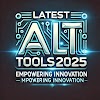Latest AI Tools 2025: Unleashing the Power of Next-Gen Technology
In the rapidly advancing world of artificial intelligence, 2025 stands out as a groundbreaking year. With innovative AI tools reshaping industries, professionals and businesses are unlocking unprecedented efficiency and creativity. Imagine solutions so advanced that they predict challenges before they occur or tools that transform mundane tasks into seamless experiences. Sounds intriguing, doesn’t it? Let’s dive into the latest AI tools of 2025, their transformative applications, and how they’re revolutionizing the world around us.
1. Introduction to AI Tools in 2025
AI tools have come a long way, transitioning from simple automation to sophisticated systems capable of decision-making, problem-solving, and even creative thinking. The latest tools are designed to cater to specific industries, improve workflows, and bring unmatched convenience.
Why 2025 is Pivotal
This year marks a surge in AI tools focused on enhancing personalization, boosting security, and optimizing global operations. From healthcare to entertainment, AI is touching every aspect of human life, making it indispensable.
2. The Key Trends Shaping AI Tools in 2025
AI development in 2025 revolves around several key trends:
- Hyper-Personalization: Tools adapt to user behavior and preferences in real-time.
- Ethical AI: Greater focus on transparency and fairness.
- Integration of AI with IoT: Savvy gadgets becoming more intelligent with artificial intelligence reconciliation..
- Edge Computing: AI tools working faster with real-time processing closer to the user.
3. Top AI Tools of 2025
Here are some standout AI tools making waves in 2025:
A. Chat GPT Enterprise 2.0
An advanced conversational AI capable of handling complex customer service interactions and generating human-like content. Businesses are leveraging this tool for seamless communication with clients.
B. Neural Studio Pro
This tool revolutionizes creative fields like video editing and music production, using AI to assist creators in achieving professional-grade outputs with minimal effort.
C. BioMedAI Assistant
A healthcare-focused AI, this tool aids in diagnosing diseases, analyzing patient data, and even suggesting personalized treatment plans.
D. QuantumThink AI
Designed for researchers and tech enthusiasts, QuantumThink speeds up data analysis for quantum computing, enabling breakthroughs in science and engineering.
4. Applications of AI Tools Across Industries
A. Healthcare
AI tools like BioMedAI are enhancing patient care by identifying potential health risks early, streamlining operations in hospitals, and supporting drug discovery.
B. Education
Interactive AI platforms are redefining learning. Tools analyze student performance, adapt lessons to individual needs, and provide real-time feedback.
C. Business and Marketing
AI-driven marketing platforms analyze consumer behavior, predict trends, and deliver hyper-targeted campaigns that maximize ROI.
D. Entertainment and Media
From creating scripts to generating immersive gaming environments, AI tools are empowering storytellers and game developers to push creative boundaries.
5. Benefits of the Latest AI Tools
- Increased Efficiency: Tasks that took hours can now be completed in seconds.
- Cost Reduction: Businesses save resources by automating repetitive tasks.
- Better Decision-Making: Information driven bits of knowledge lead to more astute techniques.
- Enhanced Creativity: AI tools amplify human creativity by handling technical complexities.
6. Ethical Considerations in AI Development
While the benefits are undeniable, it’s crucial to address ethical concerns:
- Bias in Algorithms: Developers are working to ensure fairness and reduce bias.
- Data Privacy: Protecting user data remains a top priority.
- Transparency: Guaranteeing clients comprehend how artificial intelligence frameworks decide.
7. The Fate of artificial intelligence Apparatuses Past 2025
As computer based intelligence keeps on advancing, we can anticipate much additional momentous turns of events. Future AI tools may possess emotional intelligence, enabling more empathetic human-machine interactions. Moreover, advancements in AI ethics and regulation will ensure safe and fair deployment.
8. How to Choose the Right AI Tool for Your Needs
With so many options, selecting the best AI tool can be daunting. Here’s a quick guide:
- Define Your Goals: What issue would you say you are attempting to settle?
- Check Compatibility: Guarantee the instrument coordinates with your current frameworks.
- Evaluate User Reviews: Learn from others’ experiences.
- Consider Costs: Balance affordability with functionality.
9. Frequently Asked Questions (FAQs)
Q1: What makes AI tools of 2025 unique?
AI tools in 2025 are defined by their advanced personalization capabilities, integration with IoT, and real-time processing power.
Q2: Are AI tools replacing human jobs?
Not entirely. AI tools are designed to complement human efforts, taking over repetitive tasks while humans focus on creative and strategic work.
Q3: How can small businesses benefit from AI tools?
Small businesses can use AI for cost-effective marketing, efficient customer service, and streamlined operations.
Q4: Are AI tools in 2025 secure?
Yes, most AI tools prioritize security with encrypted data and strict compliance protocols.
Q5: What industries benefit most from AI tools?
Healthcare, education, entertainment, and business are among the industries reaping the greatest benefits from AI tools.
Q6: How accessible are these tools for non-technical users?
Many AI tools are user-friendly, with intuitive interfaces designed for non-technical users.
10. Conclusion
The latest AI tools of 2025 are not just technological marvels; they’re redefining how we live, work, and create. By embracing these advancements, individuals and businesses can unlock unparalleled opportunities for growth and innovation.
As we stand on the cusp of an AI-driven future, one thing is certain: the tools we adopt today will shape the world of tomorrow.





0 Comments